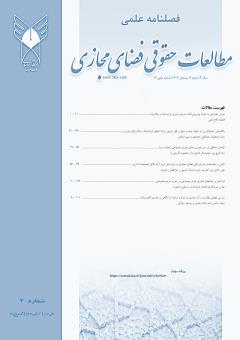بررسی تطبیقی نظارت بر آراء داوری در ایران و ترکیه ( با نگاهی بر داوری الکترونیک)
محورهای موضوعی : فصلنامه مطالعات حقوقی فضای مجازیسعید حاجی زاده 1 , عادل عباسی 2 , یوسف مولایی 3
1 - گروه حقوق دانشگاه ازاد اسلامی ارومیه . ارومیه . ایران
2 - استادیار دانشگاه آزاد اسلامی واحد ارومیه
3 - استادیار گروه حقوق خصوصی، واحد ارومیه، دانشگاه آزاد اسلامی، ارومیه، ایران/
کلید واژه: نظارت, کنترل قضایی, داوری, حقوق داخلی, داوری الکترونیک,
چکیده مقاله :
با گسترش تحولات اجتماعی در حوزه طرق و شیوه های حل و فصل دعاوی ، داوری یکی از مهمترین نهادها در ساماندهی ترافعات بوده و از این رو نیازمند سیستم سازی و ابزارزایی حقوقی جهت استقرار و اثربخشی می باشد. فرایند اتخاذ تصمیم توسط داور که در دادنامه وی تبلور می یابد ، با اظهار نظر محاکم در باب شکلی و ماهوی دادنامه اصداری در صورت تقاضای طرفین قابلیت تایید یا نقض خواهد یافت . نظامهای حقوقی مختلف رویکردهای تقنینی خاصی را به اعتبار اهمیت جایگاه داوری در ساختار خود نسبت به آرائ اصداری داور داشته اند که در مقاله حاضر به بررسی آن در دو نظام حقوقی ایران و ترکیه خواهیم پرداخت . آنچه مسلم است وقوف داور بر قواعد موجد حق و احراز روح حاکم بر موضوع متنازع فیه از یکسو و بررسی و اظهارنظر منطبق با اصول داوری در پرتو اصل توسیع حل اختلاف توسط جامعه مدنی از سوی دیگر توسط دادگاه ، منجر به اتقان آرائ داوری و نهادینه سازی بستر آن خواهد بود.از آنجا که بستر مجازی امکان تعاملات و تبادلات اجتماعی را تسهیل نموده و داوری الکترونیک نیز واجد امتیازاتی از حیث حذف موانع موجود در داوری سنتی میباشد ، به چالشهای پیش رو در حوزه مذکور نیز اشاره خواهد گردید.
With the development of social developments in the field of ways and methods of settling claims, arbitration has been one of the most important institutions in organizing disputes, and therefore it requires systematization and legal tools for establishment and effectiveness.The process of making a decision by the arbitrator, which is crystallized in her document, will be approved or rejected by the court's opinion on the form and content of the issuance document if requested by the parties. Different legal systems have had special legislative approaches due to the importance of the position of arbitration in their structure in relation to the arbitrator's opinions, which we will examine in the present article in the two legal systems of Iran and Turkey. What is certain is that the arbitrator's adherence to the rules establishing the right and verifying the ruling spirit of the disputed issue on the one hand, and examining and commenting in accordance with the principles of arbitration in the light of the principle of expanding dispute resolution by civil society, on the other hand, by the court, lead to the consolidation of arbitration opinions and institutionalization. It will be its bed. Since the virtual platform facilitates the possibility of social interactions and exchanges, and electronic arbitration also has advantages in terms of removing obstacles in traditional arbitration, the upcoming challenges in the mentioned field will also be mentioned.


